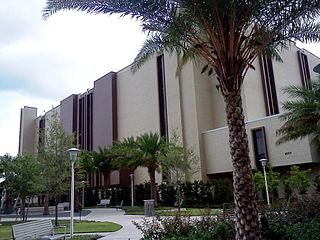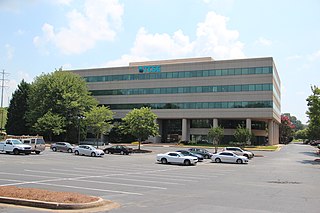
Open educational resources (OER) are teaching, learning, and research materials intentionally created and licensed to be free for the end user to own, share, and in most cases, modify. The term "OER" describes publicly accessible materials and resources for any user to use, re-mix, improve, and redistribute under some licenses. These are designed to reduce accessibility barriers by implementing best practices in teaching and to be adapted for local unique contexts.

Robert Laurent Caret is an American academic and university administrator. He is the former chancellor of the University System of Maryland and former president of San José State University, Towson University and the University of Massachusetts System.
The California Digital Library (CDL) was founded by the University of California in 1997. Under the leadership of then UC President Richard C. Atkinson, the CDL's original mission was to forge a better system for scholarly information management and improved support for teaching and research. In collaboration with the ten University of California Libraries and other partners, CDL assembled one of the world's largest digital research libraries. CDL facilitates the licensing of online materials and develops shared services used throughout the UC system. Building on the foundations of the Melvyl Catalog, CDL has developed one of the largest online library catalogs in the country and works in partnership with the UC campuses to bring the treasures of California's libraries, museums, and cultural heritage organizations to the world. CDL continues to explore how services such as digital curation, scholarly publishing, archiving and preservation support research throughout the information lifecycle.
Gulf University for Science & Technology (GUST) is the first private university established in Kuwait. It has a dual-enrollment agreement with the University of Missouri–St. Louis.

The State Library of Ohio is a state agency that provides services to state government and all types of libraries to ensure that all Ohio residents, rich or poor, rural or urban, receive the best possible library service and are able to engage in lifelong learning which strengthens the economic health of Ohio.
An open textbook is a textbook licensed under an open license, and made available online to be freely used by students, teachers and members of the public. Many open textbooks are distributed in either print, e-book, or audio formats that may be downloaded or purchased at little or no cost.
The Tufts OpenCourseWare (OCW) project, was a web-based publication of educational material from a number of Tufts University courses, providing open sharing of free, searchable, high-quality course content to educators, students, and self-learners throughout the global community. The Tufts OCW initiative encouraged the publication and free exchange of course materials on the World Wide Web. First launched in June 2005, Tufts OCW provided materials with strong representation from Tufts' health sciences schools, some of which were equivalent to textbooks in depth. All materials on the Tufts OCW site were accessible and free of charge. As Tufts OCW is not a distance learning program, no registration, applications, prerequisites, or fees are required and no credit is granted. Tufts ended funding for its Open Courseware initiative in 2014, and content on the Tufts OCW web site was removed on June 30, 2018.

The Institute for the Study of Knowledge Management in Education (ISKME), is a 501(c)(3) non-profit organization founded in 2002. Located in Half Moon Bay, California, its mission is to make learning and knowledge sharing participatory, equitable, and open.

Open educational practices (OEP) are part of the broader open education landscape, including the openness movement in general. It is a term with multiple layers and dimensions and is often used interchangeably with open pedagogy or open practices. OEP represent teaching and learning techniques that draw upon open and participatory technologies and high-quality open educational resources (OER) in order to facilitate collaborative and flexible learning. Because OEP emerged from the study of OER, there is a strong connection between the two concepts. OEP, for example, often, but not always, involve the application of OER to the teaching and learning process. Open educational practices aim to take the focus beyond building further access to OER and consider how in practice, such resources support education and promote quality and innovation in teaching and learning. The focus in OEP is on reproduction/understanding, connecting information, application, competence, and responsibility rather than the availability of good resources. OEP is a broad concept which can be characterised by a range of collaborative pedagogical practices that include the use, reuse, and creation of OER and that often employ social and participatory technologies for interaction, peer-learning, knowledge creation and sharing, empowerment of learners, and open sharing of teaching practices.
MERLOT is an online repository and international consortium of institutions of higher education, industry partners, professional organizations, and individuals. MERLOT partners and members are devoted to identifying, peer reviewing, organizing, and making available existing online learning resources in a range of academic disciplines for use by higher education faculty and students.
This outline of open educational resources provides a way of navigating concepts and topics in relation to the open educational resources (OER) movement.
Open Course Library (OCL) is an effort by the State of Washington to identify and make available digitally, to community and technical college instructors and students across that state, free textbooks, interactive assignments, and videos. Instructional materials can be "a smorgasbord of teaching modules and exercises developed by other open-learning projects.. . Interactive-learning Web sites and even instructional videos on YouTube. . ." However, OCL is not an OER publishing project, although it did contribute to the development of some widely used resources. Goals include: lowering textbook costs for students, providing new resources for faculty to use in their courses; and fully engaging in the global OER or open educational resources discussion.

University of Cape Town Libraries is the library system of the University of Cape Town in Cape Town, South Africa.

The Elyachar Central Library is the central body in the Technion library system. As such, it has a dual role: to provide an infrastructure for all the Technion libraries and to provide various services to its patrons. The Central Library determines policies and guidelines for all the Technion libraries. The library's building is located in the heart of the Nave-Shaanan Campus in Haifa. Funding for the building was contributed by Colonel Jehiel Elyachar and the library is named after him.

The University of South Florida Tampa Library is the main research library for the University of South Florida. Housing over 1.3 million books, academic journals and electronic resources, including 52,000 e-journal subscriptions, 443,000 e-books, and over 800 databases, the library has more than 2 million visitors each year. The library offers tutoring and writing services, laptops, a career resource center, and course reserves. The facility houses several special and digital collections, including literature, oral histories, photographs, artifacts, and the university archives. The current Dean of USF Libraries is Todd Chavez.
Open Educational Practices in Australia refers to the development, implementation and use of Open educational resources (OER), open access, open learning design, open policies, and Massive Open Online Courses (MOOCs) to open up education in Australia.
Open educational resources in Canada are the various initiatives related to open education, open educational resources (OER), open pedagogies (OEP), open educational practices (OEP), and open scholarship that are established nationally and provincially across Canadian K-12 and higher education sectors, and where Canadian based inititatives extend to international collaborations.

The Georgia Public Library Service (GPLS) is the state agency for libraries in the U.S. State of Georgia and a unit of the University System of Georgia. The service was initially founded in 1996 after the inception of the Library Services and Technology Act (LSTA), and in July 2000 moved from the Georgia Department of Technical and Adult Education (DTAE) to the Georgia Board of Regents and University System of Georgia. Julie Walker is the current State Librarian.

In Montana, TRAILS is a statewide consortium of academic libraries which includes all 23 of Montana's public, private and tribal community colleges and universities. TRAILS serves over 49,500 students, faculty, researchers and community members, providing access to over 4,000,000 library items. The consortium is expected to save seven million dollars over a five-year period. TRAILS maximizes the return on resource investment, enhances teaching and research, improves the user experience, and encourages shared expertise among members of institutions across the state.
The Community College Consortium for Open Educational Resources (CCCOER) promotes the awareness of open educational policies, practices, and resources. CCCOER is part of Open Education Global. CCCOER describes itself as a community of practice for open education, providing various resources, support, and opportunities for collaboration for learning, planning, and implementing successful open educational programs at community colleges and technical colleges. This support includes webinars, online advocacy events and conferences, a community email list, community blog, workshops and presentations throughout North America, as well as generally raising awareness of open education and supporting the needs of students and faculty at colleges adopting open educational resources and full degree pathways.









